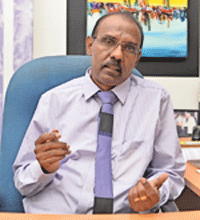Printing jobs no longer lure Sri Lankan youth
View(s):
Sisira Baranage
Sri Lanka’s printing industry is currently grappling with attempts to ensure staff turnover is high but youth tend to leave due to the non-attractiveness of being employed in this sector. Sri Lanka Printing Institute CEO and Board member Sisira Baranage said in an interview that the printing industry should create the right environment to attract youth to the sector as the demand from workers are for adequate salaries and improved working conditions. “We worry about turnover not because people leave employer A to B but because employees completely leave the industry,” he explained. Further Mr. Baranage pointed out that today the older employees retire and replacements could not be found. In fact senior staffers were not involved in training the new recruits either as a result of which useful trade secrets are held back from those taking over and the youth find it difficult to stay on in the job.
The Sri Lanka Institute of Printing has a training course for offset printing machine operators who are in high demand but it was found that during a survey most of these trainees employed preferred to have an improved internal atmosphere in addition to external appearances, Mr. Baranage explained. Moreover, he noted that a survey among school leavers found that most preferred to be their own employer like driving a three wheeler becoming independent as opposed to gaining vocational training jobs through higher education. Worker requirements like improved working conditions are justified, he said highlighting the fact that some organisations’ printing press is in a dark location, poorly lit, littered floors and thick layer of oil and ink on floors with the lunch room and printing machine in close proximity to the toilets.
Moreover, Mr. Baranage pointed out that workers were also not provided uniforms, not paid on time, lack of medical facilities, and forced to operate overtime. The printing industry is plagued with a number of issues, he said adding that currently there are about 10,000 printers in Sri Lanka but the association has only about 400 members. It was also noted that to ensure that workers get time to spend hours with their family, employers must assure flexible working hours with about two days leave per week and adequate training. Commenting on the low salary structure in the printing industry, Mr. Baranage noted that this was due to the fact that printers purchase material on one months’ credit and once the job is completed it takes about six months to get paid which is a situation that the industry should work out on resolving collectively.
When Mr. Baranage, a former Press Manager of the Gulf News, was asked to improve on his work performance six months into the job he had decided to quit but was asked to stay back by his superiors due to his good workmanship that won accolades for the new establishment. Salaries should be at a higher level if the industry is to attract young people to join the manufacturing sector, he said adding that the larger companies should not pride themselves by saying ‘we’ are paying 10-20 per cent above the lowest wage level. “When they say you could earn a certain amount that includes about 150 – 175 hours overtime in addition to 180 hours they have to work during a month. This means employees spend most of the time away from their families,” Mr. Baranage explained.


